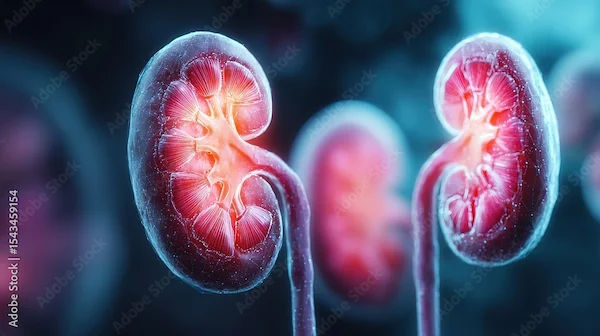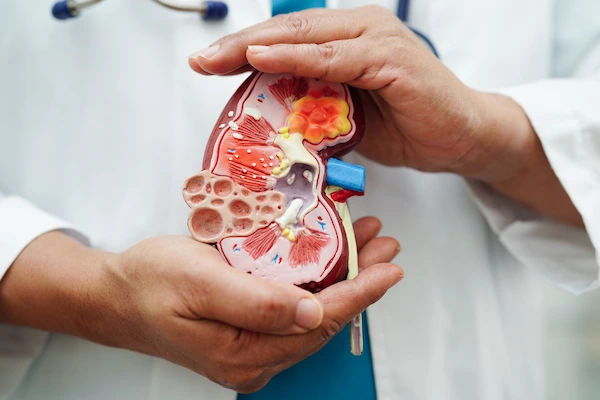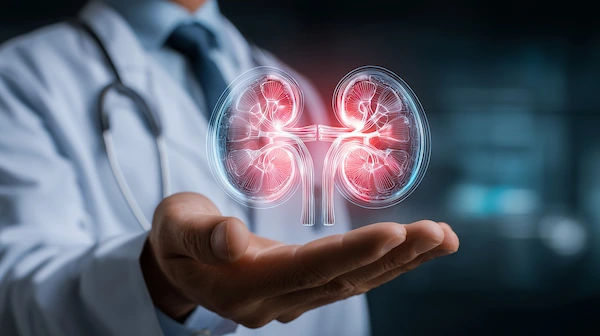Your Kidneys in Winter: The Hidden Link Between Air Pollution and Renal Health
Discover how winter air pollution and cold weather impact kidney health, the risks involved, and proactive steps to protect your renal function.


Introduction
Winter brings with it cosy jumpers and hot beverages, but it also ushers in a season of heightened health risks, especially for our vital organs. While we often worry about colds and flu, we rarely consider the silent impact of winter on our kidneys. The combination of cold temperatures and dangerously high levels of air pollution creates a perfect storm that can significantly strain these essential filters. This article delves deep into the often-overlooked connection between winter air quality and kidney health. We'll explore the science behind how pollutants like PM2.5 travel from the air into your bloodstream, directly impacting renal function. More importantly, we will provide a practical, actionable guide to shield your kidneys, helping you navigate the winter months with greater awareness and better health. Understanding this link between kidney health and the winter air we breathe is the first step towards effective prevention.
Why Winter is a Critical Season for Kidney Health
The Double Threat: Cold Weather and Polluted Air
Winter presents a unique challenge to our bodies. The cold weather itself causes physiological changes, such as vasoconstriction (narrowing of blood vessels), which can increase blood pressure. Since the kidneys are highly vascular organs, they are sensitive to changes in blood pressure. Simultaneously, meteorological conditions in winter often lead to air pollution traps. Temperature inversions prevent the dispersion of pollutants, causing smog and particulate matter to accumulate at ground level. This creates a double threat: the cold stresses the cardiovascular system that the kidneys rely on, while the polluted air introduces toxins that the kidneys must work overtime to filter out.
Understanding Your Kidneys' Vital Role as Filters
Think of your kidneys as your body's sophisticated, built-in water filtration system. Every day, they process about 150 quarts of blood to sift out about 1–2 quarts of waste and extra water, which becomes urine. This process removes toxins, balances electrolytes, and regulates blood pressure. When the blood is laden with harmful particles from polluted air, these filters face an increased workload. Over time, this extra strain can contribute to wear and tear, potentially leading to or exacerbating kidney disease.
The Invisible Danger: How Winter Air Pollution Directly Harms Your Kidneys
From Lungs to Kidneys: The Journey of PM2.5
The most significant threat comes from fine particulate matter known as PM2.5—particles so small they are about 3% the diameter of a human hair. When we inhale, these particles bypass our respiratory defences and enter the bloodstream directly through the alveoli in the lungs. Once in the bloodstream, they circulate throughout the body. The kidneys, whose job is to filter the blood, inevitably encounter these particles. Studies, including a large one published in the Journal of the American Society of Nephrology, have found a strong association between PM2.5 exposure and a decline in glomerular filtration rate (GFR), a key marker of kidney function.
Inflammation and Oxidative Stress: The Internal Attack on Renal Cells
PM2.5 particles don't just physically block the delicate filtering units of the kidneys (the nephrons). They also trigger a harmful biological response. The body recognises these particles as foreign invaders, activating immune cells and leading to systemic inflammation. This inflammation can damage the renal tissues. Furthermore, the particles cause oxidative stress—an imbalance between free radicals and antioxidants—which can damage cells and proteins within the kidneys, accelerating the ageing process of these organs and impairing their function.
Health topic carousel:
Doctor's speciality: Nephrology
Text: Consult a Nephrologist for the best advice
The Blood Pressure Connection: How Pollution Strains Renal Arteries
Research has consistently shown that exposure to high levels of air pollution can lead to acute spikes in blood pressure. For the kidneys, high blood pressure is a major risk factor for damage. The renal arteries are delicate, and sustained hypertension can harden and narrow these vessels, reducing blood flow to the kidneys. This ischaemia (lack of blood flow) can cause further injury, creating a vicious cycle where kidney damage leads to worse blood pressure control, which in turn causes more kidney damage. This is a critical mechanism linking poor winter air quality to the progression of kidney disease.
Are You at Increased Risk? Identifying Vulnerable Groups
Individuals with Pre-existing Kidney Conditions (CKD)
For the millions living with Chronic Kidney Disease (CKD), the added burden of winter pollution can be particularly dangerous. Their kidneys are already compromised and have less functional reserve to handle the increased toxic load and inflammatory response. This can accelerate the decline of kidney function, potentially hastening the need for dialysis. For this group, proactive measures are not just beneficial; they are essential.
People with Hypertension and Diabetes
Hypertension and diabetes are the two leading causes of CKD. Individuals with these conditions already have a heightened risk of kidney damage. The additional stress from air pollution and cold-weather-induced blood pressure fluctuations can significantly compound this risk. Meticulous management of blood sugar and blood pressure, along with strict adherence to pollution protection strategies, is crucial during the winter months.
The Elderly and Young Children
The elderly often have diminished organ function and a higher prevalence of underlying conditions, making their kidneys more vulnerable. Children are at risk because their organs are still developing, and they have a higher breathing rate relative to their body size, which can lead to a greater intake of pollutants per pound of body weight.
Proactive Protection; Your Action Plan for Healthier Kidneys
Monitoring Air Quality: Tools and Tips for Daily Life
Knowledge is power. Make it a habit to check the Air Quality Index (AQI) daily using apps or websites. On days when the AQI is "Unhealthy" (especially for sensitive groups), limit your time outdoors. If you must go out, try to do so in the afternoon when pollution levels might be slightly lower than during the morning rush hour. Wearing a well-fitted N95 or KN95 mask can significantly reduce the inhalation of harmful particles.
Creating a Safe Indoor Haven: Air Purifiers and Humidity Control
Your home should be your sanctuary. Invest in a good-quality air purifier with a HEPA filter, which is effective at capturing PM2.5 particles. Keep windows closed on high-pollution days. Furthermore, winter air is dry, which can lead to dehydration. Using a humidifier can help maintain optimal indoor humidity levels (between 30–50%), which is easier on your respiratory system and can help you stay hydrated.
Strategic Hydration: Balancing Fluid Intake in Cold Weather
We naturally feel less thirsty in the cold, but our body's need for water remains. Adequate hydration is fundamental for helping your kidneys flush out toxins. Aim for 2–3 litres of water per day, unless your doctor has advised fluid restriction. Herbal teas and warm water with lemon are excellent winter-friendly options to meet your hydration goals.
An Anti-inflammatory Diet to Counteract Pollution Effects
You can support your body's defence systems from the inside out. Focus on an anti-inflammatory diet for kidneys rich in antioxidants. Include foods like:
Berries: Blueberries, strawberries, and raspberries are packed with antioxidants.
Leafy Greens: Spinach and kale (in moderation for those with advanced CKD).
Fatty Fish: Salmon and mackerel are high in anti-inflammatory omega-3 fatty acids.
Turmeric and Ginger: Known for their potent anti-inflammatory properties.
Reducing processed foods, sugar, and excessive salt can also help manage blood pressure and reduce overall inflammation. If you have specific dietary restrictions related to a kidney condition, it's best to consult a doctor or nutritionist online with Apollo24|7 to create a personalised plan.
Conclusion
As the winter chill sets in and the smog descends, taking proactive steps to protect your kidney health becomes paramount. The connection between the quality of the air we breathe and the function of our kidneys is clear and backed by growing scientific evidence. By understanding the risks—from the journey of PM2.5 particles to the resulting inflammation and blood pressure spikes—you empower yourself to take effective action. This winter, go beyond the usual health advice. Make a conscious effort to monitor air quality, create a clean air environment at home, stay hydrated, and nourish your body with kidney-supportive foods. Your kidneys work tirelessly for you; returning the favour with these mindful practices is one of the best investments you can make in your long-term health. If you have concerns about your kidney function, especially if you fall into a high-risk category, don't hesitate to book a physical visit to a doctor with Apollo24|7 for a comprehensive evaluation. Apollo24|7 also offers convenient
FAQs
Can wearing a mask really help protect my kidneys from pollution?
Yes, absolutely. A well-fitted N95 or KN95 mask is highly effective at filtering out PM2.5 particles. By preventing these particles from entering your lungs and bloodstream, you directly reduce the toxic burden on your kidneys, offering a simple yet powerful layer of protection on high-pollution days.
I have early-stage kidney disease. What specific precautions should I take in winter?
In addition to following your nephrologist's advice meticulously, you should be extra vigilant about air quality. Strictly limit outdoor exposure when the AQI is poor, prioritise using an air purifier at home, and ensure you are meeting your fluid goals. It's also crucial to monitor your blood pressure regularly, as winter can cause fluctuations. Consulting your doctor online with Apollo24|7 for personalised guidance is highly recommended.
Are there any specific signs that air pollution might be affecting my kidneys?
Kidney damage is often silent until later stages. However, general signs that should prompt a doctor's visit include persistent fatigue, swelling in your ankles or around your eyes, changes in urination frequency or colour, and difficulty concentrating. These symptoms can have many causes, but kidney function should be checked.
Besides water, what are the best fluids for kidney health in winter?
Herbal teas (like chamomile or dandelion root, but check with your doctor if you have CKD), warm water with lemon, and clear broths are excellent choices. It's best to avoid sugary drinks and excessive caffeine, which can be dehydrating.
How quickly can air pollution impact kidney function?
The effects can be both acute and chronic. A single day of very high pollution can cause temporary changes in blood pressure and vascular function. Long-term, chronic exposure is linked to a gradual, sustained decline in kidney function over months and years, highlighting the importance of consistent protection.
Health topic carousel:
Doctor's speciality: Nephrology
Text: Consult a Nephrologist for the best advice
Consult Top Specialists for Personalised Tips

Dr. Kity Sarkar
Nephrologist
15 Years • MBBS,MD(Genl. Med.), DrNB(NEPHROLOGY)
Kolkata
Dr. Kity Sarkar's Clinic, Kolkata

Dr. Pardha Saradhi
Nephrologist
9 Years • MBBS, MD-DNB (Gen. Med.), DNB (Nephro)
Hyderabad
Apollo Hospitals D R D O kanchanbagh, Hyderabad
(75+ Patients)
Dr Ch Sashidhar
Nephrologist
20 Years • MBBS, MD General Medicine, DNB, Nephrology
Secunderabad
Apollo Hospitals Secunderabad, Secunderabad

Dr. Manju Kamal
Nephrologist
12 Years • MBBS,MD(General Medicine), DNB,DM(Nephrology)
Angamaly
Apollo Hospitals Karukutty, Angamaly

D. Akshay Zalavadiya
Nephrologist
3 Years • MBBS, MD, DM Nephrology
Ahmedabad
Beacon kidney consult, Ahmedabad
Consult Top Specialists

Dr. Kity Sarkar
Nephrologist
15 Years • MBBS,MD(Genl. Med.), DrNB(NEPHROLOGY)
Kolkata
Dr. Kity Sarkar's Clinic, Kolkata

Dr. Pardha Saradhi
Nephrologist
9 Years • MBBS, MD-DNB (Gen. Med.), DNB (Nephro)
Hyderabad
Apollo Hospitals D R D O kanchanbagh, Hyderabad
(75+ Patients)
Dr Ch Sashidhar
Nephrologist
20 Years • MBBS, MD General Medicine, DNB, Nephrology
Secunderabad
Apollo Hospitals Secunderabad, Secunderabad

Dr. Manju Kamal
Nephrologist
12 Years • MBBS,MD(General Medicine), DNB,DM(Nephrology)
Angamaly
Apollo Hospitals Karukutty, Angamaly

D. Akshay Zalavadiya
Nephrologist
3 Years • MBBS, MD, DM Nephrology
Ahmedabad
Beacon kidney consult, Ahmedabad




